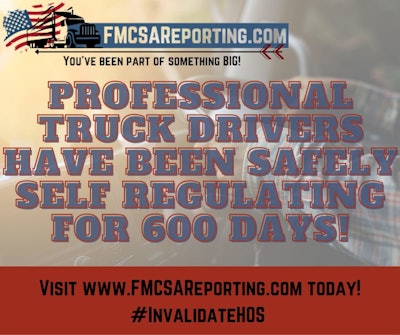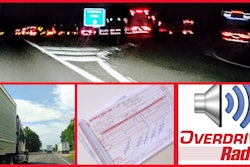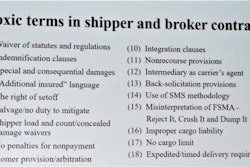Regular readers and Overdrive Radio podcast listeners will recall my conversation with Trucker Nation regulatory affairs lead Andrea Marks about what she sees as the promise of the COVID-19 hours waiver's long tenure, allowing truckers hauling a bevy of commodities under certain conditions to run without regard to limitations imposed by everybody's favorite set of regs -- the hours of service.
A short few weeks after that conversation, held in part to break down changes to the waiver that certainly narrowed its application and that Marks felt seemed designed to limit its use, Trucker Nation teamed up with a compliance consultant out of the state of South Dakota, D&K Truck Compliance. Their new effort is under way to gather data, independently of FMCSA, from carriers and individual drivers who have operated under the COVID waiver the past year and a half and more. The team is not shy about what it believes could be the result.
 When Marks announced the partnership and data collection effort, centered around a module set up at the FMCSAReporting.com website, she noted that "for 600 days professional truck drivers have been proving the point we were all trying to make when we petitioned to change HOS." Trucker Nation wanted full split-sleeper flexibility when that petition was filed in 2018. The goal now is again to have an effect akin to the "squeaky wheel" I invoked in that post from summer 2018. Marks hopes data point the way toward a reality that "professional truck drivers can safely self regulate and it can have a positive impact on highway safety.
When Marks announced the partnership and data collection effort, centered around a module set up at the FMCSAReporting.com website, she noted that "for 600 days professional truck drivers have been proving the point we were all trying to make when we petitioned to change HOS." Trucker Nation wanted full split-sleeper flexibility when that petition was filed in 2018. The goal now is again to have an effect akin to the "squeaky wheel" I invoked in that post from summer 2018. Marks hopes data point the way toward a reality that "professional truck drivers can safely self regulate and it can have a positive impact on highway safety.
FMCSA signaled its intention to utilize data collected from carriers running under the COVID-19 exemption post-September 1 for purposes of understanding "how many carriers use the exemptions, how often, and for what purposes," as spokesman Duane DeBruyne told me around the time of changes to the exemption. Those changes delivered a reporting requirement -- maybe more of an ask depending on who you're talking to -- to carriers using it.

Marks believes the agency's own data collection will never go so far as what Trucker Nation feels ought to be done -- a close look at safety outcomes of carriers utilizing the exemption versus those not doing so, with potential to point ways forward to further hours of service reform. "We have to gather the data that we all have been generating for the past 600 days," she wrote earlier this month, announcing the partnership with D&K. "FMCSA has a more than lackluster mechanism for reporting that they've done nothing but give mixed signals about since they announced a reporting 'requirement' ... We can do better!"
Results from our polling of Overdrive readers, which we published originally at this link, about their use of the exemption indicate a substantial portion at least of the owner-operated trucking segment has in fact utilized the COVID waiver, raising the chance for meaningful results from data collected.
Marks believes the agency is in some ways discouraging reporting and even use of the COVID waiver with limitations in place as of September 1 -- the waiver's narrowed application only to drive/duty-time limits, and not for instance the 392.3 officer-judgment-call prohibition of "ill" or "fatigued" driving. The newest version of the waiver requires time to be logged as if normal, even though hours of service limits don't apply. "Why are we asking truck drivers to capture hours that they aren’t subject to?" Marks asked. "We’re setting up drivers" for officers to make that "fatigued" judgment call based on on-duty time limits they're not subject to under the waiver. "The fact that FMCSA is doing this to drivers amidst a supply chain crisis is disgusting," she believed.
The agency said its data collection effort on COVID-waiver use, announced in tandem with the waiver changes that came into effect September 1, is for information purposes only. When I asked whether the data reporting was required, FMCSA didn't exactly answer that part of the question, as suggested above. Marks worried about the prospect of after-the-fact audit targeting, too, a concern that I've heard from an owner-operator or two myself, limiting participation in the reporting the agency wants.
As she put it: "Who can assure me that these carriers aren’t going to be added to the 'random' auditing list, and that they’re not going to be audited retroactively and given revenue-generating violations?"
For these reasons, she feels the best chance to make good on the opportunity that the more than a year and a half now of the COVID hours waiver presents is for carriers to take matters into their own hands and report use to a nongovernmental firm -- Marks and company are attempting to fulfill that role. Yet they're still seeking an entirely independent, non-governmental, non-biased organization (ideally an academic institution, Marks said) to analyze and report the data and correlate it with safety outcomes. That, ultimately, is the goal.
Bias is tricky, for sure -- Marks fully acknowledges that she is most certainly not the person to analyze and report results, given strong bias. And I worried that there was some danger in signaling #InvalidateHOS intentions in marketing around the data-collection effort, as shown above -- selection bias, essentially, attracting only those with a story to tell that points to a predetermined goal. Yet Marks is undeterred, and insistent that she welcomes all participation from any and all parties who've utilized the COVID waiver to date. "When we get more people with more street cred in the industry than I have to support this process," she said, the organization hopes to get sufficient data for meaningful results. "There’s not a deadline at this point. This could go for a year, two years," less if participation is sufficient.
The data-entry form at Marks' and company's new FMCSAReporting.com website asks for the carrier's USDOT number, reporting month, total number of loads hauled under the COVID waiver, commodities hauled, and contact email/phone number. Marks notes that it's important that carriers specify the reporting month with each submission, going back as far as is possible, and that they collect an actual number of loads hauled under the terms of the COVID waiver. (Some carriers to date have simply input "All," necessitating manual work to reach back to the carrier to locate the actual load number.)
The current COVID-19 hours waiver is set to expire Dec. 1 if not extended.











